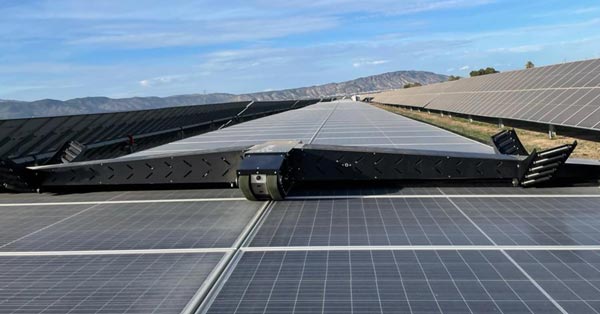Based in Italy Enel Green Power continues to drive the evolution of the renewable energy industry through its latest partnership with a Sicilian technology start-up REIWA. The collaboration has further perfected the autonomous, sustainable robot solution SandStorm for cleaning solar panels. It is considered a groundbreaking step that will redefine solar panel maintenance and promote sustainability.
As everyone knows, proper maintenance and cleanliness of solar panels are crucial to maximize energy production. The accumulation of dust, dirt or sand on solar panels can significantly reduce the operational efficiency of solar energy systems, especially in dry and dusty environments. However, traditional cleaning procedures, characterized by high water consumption and high gas emissions from the motor vehicles involved, pose significant environmental problems.

Equipped with carefully designed brushes, SandStorm can autonomously traverse the panel arrays, even those installed on solar trackers, performing a thorough and economical cleaning.
An exceptional feature of SandStorm is its ability to operate during non-productive hours, avoiding shadow issues that could hinder energy production.
SandStorm is also a great example of prioritizing safety and sustainability. It functions and charges autonomously, eliminating water and diesel consumption and thus eliminating associated carbon emissions.
From an economic perspective, SandStorm’s autonomous and waterless cleaning can significantly reduce maintenance costs for solar power plants, especially for large-scale plants in remote locations with harsh conditions and insufficient natural resources.
Following evaluations at the EGP Innovation Lab in Catania, Italy, and a large-scale assessment at Enel Green Power’s Totana plant in Spain, SandStorm is prepared for deployment at two Spanish solar power plants – Totana and Las Corchas – with a combined capacity of 135 MW.
In addition to robotic cleaning of solar panels, other robotic solutions also make a major contribution to the solar energy sector. The autonomous robotic solar construction system developed by Sarcos and solar installer Blattner has been validated by DOE and is preparing for commercial launch in 2024.
The implementation of robotic solutions is expected to ultimately lead to cheaper solar energy for private individuals and businesses, and therefore to a larger share of the solar energy mix.


